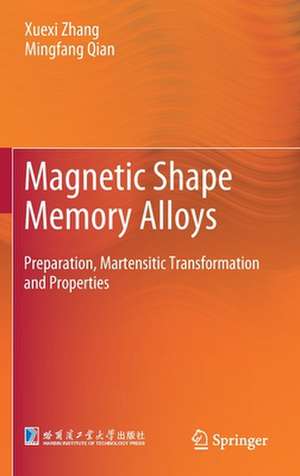Magnetic Shape Memory Alloys: Preparation, Martensitic Transformation and Properties
Autor Xuexi Zhang, Mingfang Qianen Limba Engleză Hardback – 15 noi 2021
| Toate formatele și edițiile | Preț | Express |
|---|---|---|
| Paperback (1) | 998.19 lei 6-8 săpt. | |
| Springer Nature Singapore – 16 noi 2022 | 998.19 lei 6-8 săpt. | |
| Hardback (1) | 793.36 lei 38-44 zile | |
| Springer Nature Singapore – 15 noi 2021 | 793.36 lei 38-44 zile |
Preț: 793.36 lei
Preț vechi: 1043.90 lei
-24% Nou
Puncte Express: 1190
Preț estimativ în valută:
151.81€ • 158.93$ • 125.61£
151.81€ • 158.93$ • 125.61£
Carte tipărită la comandă
Livrare economică 01-07 aprilie
Preluare comenzi: 021 569.72.76
Specificații
ISBN-13: 9789811663352
ISBN-10: 9811663351
Ilustrații: X, 268 p. 196 illus., 165 illus. in color.
Dimensiuni: 155 x 235 mm
Greutate: 0.57 kg
Ediția:1st ed. 2022
Editura: Springer Nature Singapore
Colecția Springer
Locul publicării:Singapore, Singapore
ISBN-10: 9811663351
Ilustrații: X, 268 p. 196 illus., 165 illus. in color.
Dimensiuni: 155 x 235 mm
Greutate: 0.57 kg
Ediția:1st ed. 2022
Editura: Springer Nature Singapore
Colecția Springer
Locul publicării:Singapore, Singapore
Cuprins
An overview on magnetic shape memory alloys.- Preparation and properties of bulk magnetic shape memory alloys.- Preparation and properties of magnetic shape memory alloy foams.- Preparation and heat treatment of magnetic shape memory alloy microwires.- Properties of magnetic shape memory alloy microwire.- Preparation and properties of magnetic shape memory alloy particles.- Application of magnetic shape memory alloys.
Notă biografică
Dr. Xuexi Zhang obtained his doctorate from Harbin Institute of Technology in 2003. He is now a full professor at the School of Materials Science and Engineering, Harbin Institute of Technology (China). He is one of the pioneering scientists in the field of low-dimensional magnetic shape memory alloys (MSMAs) including foams, microwires and particles. He is also interested in light-weight aluminum alloy composites reinforced by fibers, whiskers and particles for strong but light components. He has published over 120 peer-reviewed journal articles and more than 40 patents in these fields. His main research interests include (1) preparation of Ni-Mn-based MSMA foams with tailored pore architecture for multicaloric effects, (2) synthesis, microstructure and caloric effects of Ni-Mn-based MSMA microwires, (3) study the correlation between architecture—microstructure—property in MSMAs, (4) high-throughput synthesis and characterization of light-weight aluminum alloy composites.
Dr. Mingfang Qian obtained her doctorate from Harbin Institute of Technology in 2016. She is now an associate professor at School of Materials Science and Engineering, Harbin Institute of Technology (China). Her research interests are focused on ferromagnetic shape memory alloys (FMSMAs), especially the preparation, microstructure and functional properties of FMSMAs.
Dr. Mingfang Qian obtained her doctorate from Harbin Institute of Technology in 2016. She is now an associate professor at School of Materials Science and Engineering, Harbin Institute of Technology (China). Her research interests are focused on ferromagnetic shape memory alloys (FMSMAs), especially the preparation, microstructure and functional properties of FMSMAs.
Textul de pe ultima copertă
This book systematically describes the fundamentals of Magnetic shape memory alloys (MSMAs), with an emphasis on low-dimensional structures such as foams, microwires and micro-particles. The respective chapters address basic concepts and theories, the fabrication of various architectures, microstructure tailoring, property optimization and cutting-edge applications. Taken together, they provide a clear understanding of the correlation between processing and the microstructural properties of MSMAs, which are illustrated in over two hundred figures and schematics. Given its scope and format, the book offers a valuable resource for a broad readership in various fields of materials science and engineering, especially for researchers, students and engineers.
Caracteristici
Describes the preparation techniques for low-dimensional FMSMAs Shows how microstructures can be tailored for optimized functional properties Explains the correlation between processing and microstructural properties in FMSMAs
